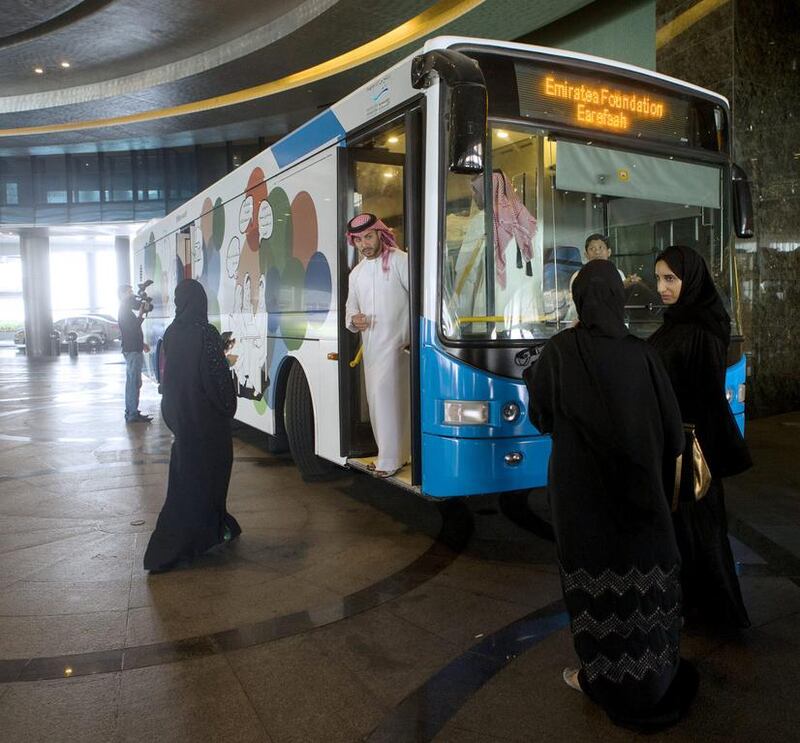Amid higher levels of consumer spending and lending, the latest financial literacy initiative in the UAE aims to train 100 people between the ages of 15 and 24 to become personal finance mentors, empowering them to pass on the skills needed to avoid the burden of heavy debt.
The Emirates Foundation for Youth Development and Operation Hope, a United States-based organisation focused on financial literacy and empowerment, have started the 100 Youth Club – a pilot project that next year will cover all the emirates – aimed at raising awareness of the need to learn how to save and manage money.
A financial literacy bus will also travel around the Emirates and be used to hold educational events and activities.
“Seventy per cent of young Emiratis are reported to be in debt because they lack effective financial planning and an increasing desire to acquire luxuries. This is an alarming number, so we felt it was essential to conduct a programme that will make the youth conscious of their spending habits. We are not only able to increase financial literacy and contribute to the reduction of debt, but also inspire, empower and guide the youth of the UAE to secure the nation’s sustainable future,” said Maytha Al Habsi, the chief programmes officer of the Emirates Foundation.
A YouGov survey for UAE Saves Week showed this month that more than half of the UAE’s residents see debt as being part of their lives for the foreseeable future. An HSBC study also showed that 50 per cent of the people living in the Emirates were not regular savers. National debt among UAE residents stood at US$95,000 per household, according to a study released in July by Strategic Analysis. Personal loans to residents rose by 3.8 per cent to Dh270.7 billion between January and May compared with a year earlier, according to Central Bank data.
The youth initiative – part of the Esref Sah programme – intends “to raise and strengthen awareness for better financial management by providing guidance to better means of spending and avoiding accumulating financial burdens in the future”, according to the foundation.
“Many young people around the world, and in the UAE, often struggle to manage and eliminate their debt and make sound financial decisions. The key component of the Esref Sah programme is that it is designed to empower youth with the tools and inspiration to take control of their financial future,” said Mary Hagerty Ehrsam, the president of the Global Youth Empowerment Group at Operation Hope and the chief executive of Hope New York.
The average total debt among teens and young adults in the US was $34,765 last year, according to the credit score provider Experian.
Businessmen, bankers and academics have also attended the foundation’s recent workshops at Zayed University (Abu Dhabi), the Higher Colleges of Technology in Dubai and UAE University in Al Ain, where Emirati youth participated.
“We are constantly looking for opportunities to collaborate with key stakeholders, experts, banks, the private sector, existing financial programmes and interested parties to build a long-term nationwide platform that is sustainable for the benefit of our youth,” Ms Al Habsi said.
The Government launched a Dh10bn fund in 2011 to help consumers restructure loans in cooperation with their banks. And the Central Bank has been working to set up Al Etihad Credit Bureau, which will allow lenders to better understand what levels of debt customers are taking on. Initially, the bureau will compile a database of individual borrowers, allowing it to provide their credit information for the preceding 24 months with a mention of any defaults that might have occurred over the preceding five years.
Borrowing costs could fall by more than 30 per cent once its credit reporting system is in place.
“According to the statistics compiled from the World Bank and International Financial Corporation, hopefully we will see at least a 30 per cent reduction in a very short time,” Younis Al Khouri, the bureau’s vice chairman and undersecretary of the Ministry of Finance, said in May.
pf@thenational.ae





